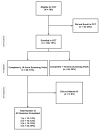Behavioral interventions for Cambodian female entertainment and sex workers who use amphetamine-type stimulants
- PMID: 26782667
- PMCID: PMC4854788
- DOI: 10.1007/s10865-016-9713-2
Behavioral interventions for Cambodian female entertainment and sex workers who use amphetamine-type stimulants
Abstract
Conditional cash transfer (CCT) and cognitive-behavioral treatments are evidence-based approaches to reduce stimulant use and sexual risk taking. We describe the adaptation and implementation of sequential behavioral interventions for Cambodian female entertainment and sex workers (FESW) who use amphetamine-type stimulants (ATS): (1) a 12-week CCT intervention; and (2) a 4-week cognitive-behavioral aftercare (AC) group. An ongoing cluster randomized stepped wedge trial in 10 Cambodian provinces is enrolling FESW with confirmed recent ATS use to examine the effectiveness of CCT + AC. In the first six provinces, 138 of the 183 eligible FESW (75 %) enrolled in CCT and completed a median of 25 (interquartile range 9-32) of the 36 urine screening visits. Of the 84 participants who were eligible for AC, 79 completed at least one session (94 %) and 57 completed three or more sessions (68 %). Culturally tailored behavioral interventions to reduce ATS use and optimize HIV prevention are feasible in resource-limited settings.
Keywords: Amphetamine-type stimulants; Cognitive-behavioral; Conditional cash transfer; Contingency management; HIV; Sex work.
Figures
References
-
- Baird SJ, Garfein RS, McIntosh CT, Ozler B. Effect of a cash transfer programme for schooling on prevalence of HIV and herpes simplex type 2 in Malawi: a cluster randomised trial. Lancet. 2012;379(9823):1320–1329. - PubMed
-
- Bowen S, Chawla N. Mindfulness-Based Relapse Prevetnion for Addictive Behaviors: A Clinican’s Guide. Guilford Press; 2011.
-
- Carroll KM, Rawson RA, editors. Relapse prevention for stimulant dependence. New York, NY: Guilford Press; 2005.
-
- Center for Substance Abuse Treatment. Client’s Handbook: Matrix Intensive Outpatient Treatment for People with Stimulant Use Disorders. Rockville, MD: Substance Abuse and Mental Health Services Administration; 2006. - PubMed
Publication types
MeSH terms
Grants and funding
LinkOut - more resources
Full Text Sources
Other Literature Sources
Medical


